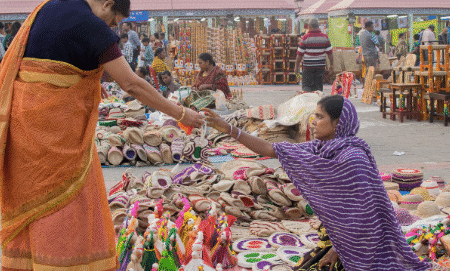Every morning on our way to a hectic day at work, a hot cup of coffee or a cutting chai is all we might need on the day to feel energized the whole day. And if, along with the hot soothing tea, you get to have the tasty roadside fritters as well, then the day is made. How easy the roadside vendors make things for us, isn’t it? Even while returning from work, you can pick up vegetables on the way. This makes shopping convenient and affordable. These humble street vendors make life easier for millions of Indians, offering food, street food, and clothes without the hassle of visiting malls and supermarkets. We have never stopped to wonder how these vendors manage to set foot in the low prices. Today, there is a discussion that focuses on the unsung heroes of urban India. The street centers whose voices may get lost in the noise of city traffic, but they are the ones making our lives better. Be it tea, water, street food, or clothes. They provide goods at rates that are within the reach of the common man. Often, everyone can’t visit the mall and buy expensive items. In a country where inflation hits hard and branded goods are unaffordable for many, these vendors become a lifeline. Their stalls reduce the pressure on household expenses. Imagine if every street vendor were removed; then people would be forced to turn to expensive alternatives, and the prices of basic commodities would continue to skyrocket. This way, the vendors also act as a balancing force against inflation. Their impact is not just economic But their impact isn’t just economic — it’s deeply social. Most of these vendors come from economically weaker sections. They don’t even have permanent jobs or fixed incomes. They earn just enough to feed their families. They represent the massive segment of self-reliant workers operating in the formal economy, yet contributing to the nation. Their existence is not without challenges and controversies. The biggest concern for the government is the loss of tax revenue. And Lakhs of people run informal businesses without paying GST or income tax. This becomes a huge problem in the market. One of the biggest concerns for governments is the loss of tax revenue. Lakhs of people run informal businesses without paying GST or income tax. Transactions are mostly in cash, with no bills or receipts. As a result, there’s no official record of their earnings or operations. These vendors are a vital part of the economy, yet they remain unregistered, invisible to the system. In some cases, this lack of regulation gives rise to more serious issues. Reports have highlighted how certain stalls, while selling snacks or belts during the day, may be misused for illegal activities at night, including the storage of counterfeit goods, minor smuggling, or sale of stolen items. While this doesn’t apply to the majority of vendors, the absence of monitoring creates room for such misuse. In some areas, even local law enforcement turns a blind eye or offers protection in exchange for bribes — a troubling symptom of deeper corruption. So what’s the way forward? The answer lies in regulation with empathy. The government needs to develop a simple, digital, and inclusive registration process for street vendors. This could include issuing QR code-based identity cards, enabling digital payments, and introducing a low monthly tax structure. Licensing should be quick and accessible. Vendors could also be provided with designated, subsidized shop spaces or vending zones. A basic PAN or Aadhaar card should be enough for registration — no red tape, no middlemen. The goal shouldn’t be to eliminate vendors or give them unchecked freedom — rather, to bring them into a formal structure. With the right framework, street vending can become a reliable source of employment and an integral part of the urban economy. And until that system is in place, what can we do? Next time you buy tea from a roadside vendor, don’t just hand over the money — give a smile too. That person is not just selling chai — he’s working hard to feed his children. Let’s be mindful of cleanliness, ask for fair prices, and engage with respect. Small actions by individuals can lead to bigger changes in society. Thank you for reading. We’ll be back soon with another thought-provoking story on Social Republic. If you have feedback or suggestions for topics you’d like us to cover, do let us know in the comments. Until next time — take care and stay thoughtful. Keep Reading Foramz for your daily dose of moral support. If you wish to listen to this topic, visit Social Republic.
CONNECTING THOUGHTS

